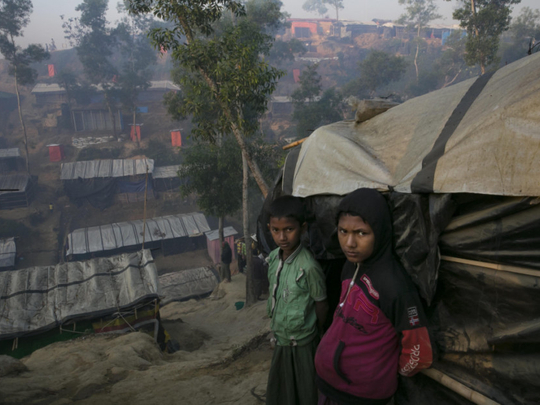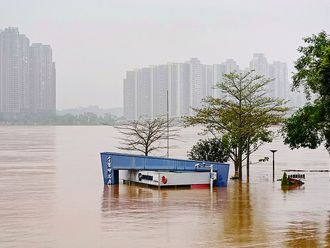
Ukhia (Bangladesh): Three months ago, these two Rohingya brothers had a loving family, a little house near a river, a worn soccer ball to play with and 15 cows for fresh milk.
It’s all gone now: The family killed. The house torched. The cows stolen.
More than 650,000 Rohingya Muslims from Myanmar fleeing a military crackdown have entered Bangladesh since late August, one of the most rapid exoduses in history. This month, the United Nations human rights chief suggested that the Myanmar military deliberately targeted civilians belonging to the minority Rohingya in “acts of appalling barbarity” that may have included “elements of genocide.”
The ordeal began August 25, when Rohingya militants attacked Myanmar police posts. Five days later, the boys’ village was inundated with soldiers who — human rights groups allege — killed, raped and burned villagers in their homes. Shamsul, eight, and Jafar, 11, followed a stream of people to Bangladesh, two of about 1,800 children who made the terrifying days-long journey to safety without their immediate caregivers, according to Unicef. Many have been taken in by neighbours or extended families, authorities say, but face dangers such as child traffickers, diseases and malnourishment.
By early December, the brothers had learned the physical landscape of the sprawling camp — which fishmonger sells the best dried fish, which adults should be avoided.
But their grief is harder to navigate. “Everyone has parents but us,” Shamsul often says out loud.
On that August morning, soldiers came to their village and sprayed the air with gunfire, according to witness accounts. The villagers scattered, some fleeing into the jungle for safety. Jafar said he took refuge on a small hill overlooking his house and watched as soldiers beat his mother, Monira, and three of his siblings, Somuda, 15, Khurshid, seven, and Shalida, three months. They pushed them into the house, barricaded the door and set the structure on fire. His family was burned alive inside, Jafar said.
Villagers who escaped Tula Toli, a small community of rice farmers also known as Min Gyi, said local boys and men, including the boys’ father, were summarily executed on a riverbank. An October report from Amnesty International said the violence at Tula Toli “appears to be one of the worst atrocities of the Army’s ethnic cleansing campaign.”
Myanmar’s military leaders and its civilian government, led by Aung San Suu Kyi, have consistently denied that security forces in the Buddhist-majority country have targeted the Rohingya.
In Tula Toli, escape for Jafar meant crossing a fast-moving river. He had been separated from Shamsul when the soldiers came, but he spotted the little boy riding in an old dinghy with others. He dove in.
Jafar swam with all his strength. “I was afraid I would lose him,” Jafar said. Several others drowned while attempting to cross.
Jafar made it out of the river and on to the bank, where he embraced Shamsul. A fellow villager who saw the two boys during the chaos said he could not believe they lived.
“They are only alive thanks to Allah,” said Ali Mia, a local leader. “God saved them.”
The boys then followed a stream of people, including some of their neighbours, on a two-day journey on foot to the Bangladeshi border — without food, through burning villages, hearing distant gunfire.
At the river crossing on the border, a grizzled smuggler refused to take them unless they each paid about $120 (Dh440), the boys said. A neighbour finally agreed to put up the money, and they followed the others to the refugee camp on the Bangladesh side.
Word of Shamsul and Jafar’s plight reached Kamal Hussain and his lost-and-found booth, a small kiosk that offers hope for separated families. In September, Hussain, also a refugee from Burma, spent his month’s salary to rent a microphone to call out names of lost children, reuniting more than 700 children with relatives and garnering support from the United Nations refugee agency.
After about two weeks, Mohammad Junaid heard of the announcement about his nephews and rushed to the camp to be reunited with them.
He and his wife, Jorina, began caring for the boys along with their own six children, ages one to 12, in their small bamboo-and-tarpaulin tent.
“They are my brother’s sons,” Junaid said. “I have to look after them. There is no other way.”
— Washington Post












